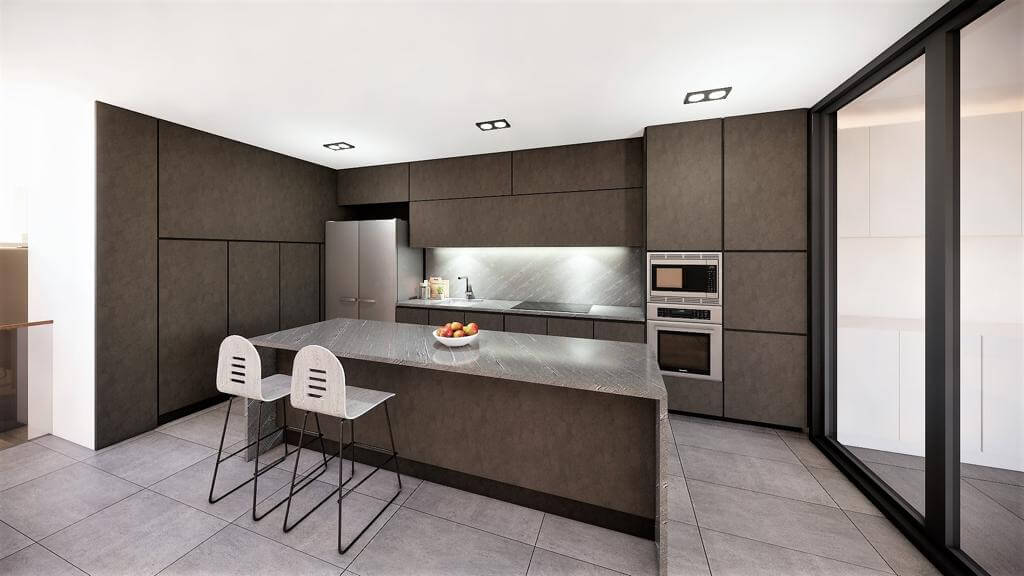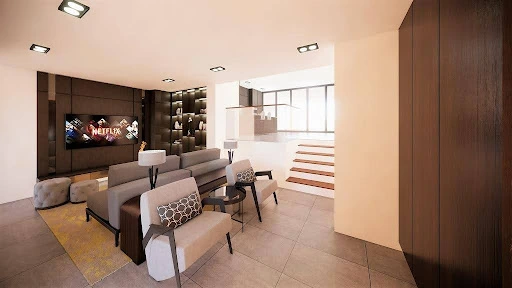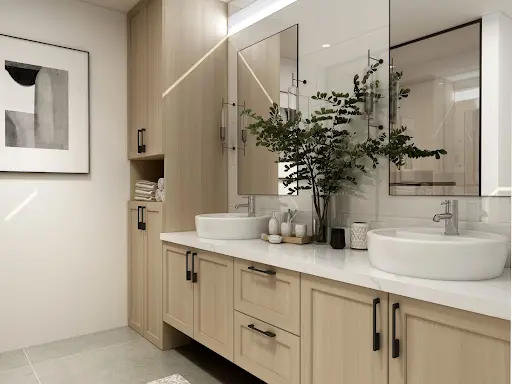
8 Types of Interior Doors To Consider For Your Home
October 22, 2021
7 Roof Design Ideas For Landed Houses in Singapore
November 5, 2021Which Kitchen Countertop Material Should You Pick?
When renovating a kitchen, choosing the right kitchen countertop material is crucial. One increasingly popular option is KompacPlus, a durable, water-resistant, and low-maintenance surface that offers a sleek, modern look.
If you cook often, you know your kitchen countertop endures heavy use—from meal prep to serving as an extra dining space in an open-concept kitchen. Available in various materials like KompacPlus, laminates, engineered quartz, solid surfaces, wood, and natural stone, each option has unique benefits. Here’s a guide to help you choose the best kitchen countertop material for your lifestyle!
Laminate countertops
Source: Formica
Laminate countertops are often made up of many layers of kraft paper boards, as well as melamine resin. Compared to other surfaces, this makes them more economical. So, if you’re searching for a low-cost countertop option, this is the one to go with.
Furthermore, maintenance is very simple and uncomplicated. Warm water, soap, and a light wipe down with a sponge or towel are all you need to keep your laminated surface looking new.
Pros:
- Natural materials, such as wood and marble, are imitated in appearance and feel
- Non-porous and long-lasting
- Heat, discolor, and spillage resistant
- Anti-fingerprint laminates are now available on the market
Cons:
- Chips can be caused by direct contact with a sharp item such as blades or scissors
- Contact with hot kitchenware over an extended period of time might cause this to melt
- Over time, it is possible that it’ll warp
KompacPlus countertops
Source: Stone Amperor
KompacPlus (or KompacTop) is extremely durable kitchen countertop material that you’ll want to consider for your kitchen. It is marketed as an “alternative to standard kitchen countertop surfaces.”
You also don’t have to remove your current countertop finish to install it. The KompacPlus may be easily installed over the existing counter.
Pros:
- Scratch-resistant, heat-resistant, impact-resistant, bubble-resistant, stain-resistant, waterproof, and non-porous
- It’s also possible to put it on your floor, walls, and furniture
- Within three working days, the installation may be finished
- Simple to keep clean — just wipe it down every now and then and you’re ready to go
- Easy to maintain
- Thicknesses of 3mm and 6mm are used to create a slim construction
Cons:
- Designs are restricted, hence not that many choices
- Joint lines that can be seen
- Long-term sun exposure might cause discoloration
- Cracks can form when you come into direct touch with heated items
Engineered quartz countertops
Source: Bob Vila
Engineered stone and quartz countertops are formed by combining crushed natural quartz together with polymer resin. It has a high level of endurance and a wide spectrum of colors as a result of this combination.
Engineered quartz surfaces, on the other hand, are not permeable like their natural equivalents. You’ll nearly never have to worry about difficult-to-remove stains or bacterial development due to water contact with this surface.
Pros:
- Impact-resistant, scratch-resistant, and stain-resistant
- A wide range of colors may be used to mimic the appearance of genuine stone such as marble
- Sanitary and non-porous
- Durable and less prone to chipping and cracking
Cons:
- Expenses are higher than those of other options
- Seam joints that can be seen
- Because of the resin, direct contact with hot items can harm the surface
Natural stone countertops
Source: Countertop Guides
Granite countertops and marble countertops are made mostly of natural stones, thus they are therefore more environmentally friendly. Certainly, this is an excellent alternative to explore if you’re more ecologically aware (and have a larger budget to deal with).
Pros:
- Veins and grains for a one-of-a-kind appearance
- If properly cared for, durable and may last for years
- Looks classy
- A diverse range of colors are available
- Edgings can be personally crafted
Cons:
- It might be pretty pricey
- Due to its porous nature, it will require sealing after installation
- Spills should be cleaned up as soon as possible to avoid permanent stains
- Professional installation is certainly required
Solid surface countertops
Source: Hyundai L&C USA
Solid surface countertops consist of a thick coating of synthetic acrylic, as the name indicates. Additionally, it is nonporous, antibacterial, and a perfect alternative for homeowners looking for a low-maintenance countertop.
Solid surface materials are the least durable of the materials available, but they are a great choice as they are the simplest to mend. Scrub or sand away the scratched or burned layers for a (almost) fresh appearance!
Pros:
- Durable kitchen countertop material
- Great variety of colors and patterns to choose from
- Can be made to look like other materials like marble and concrete
Cons:
- Heat and impact are easily damaging
- It is not stain-proof
Wood countertops
Source: Bob Vila
Almost no identical planks of wood have the same pattern, just as no two pieces of natural stone have the same appearance. Counters made of wood or butcher block will give your kitchen a distinct appeal without a doubt.
However, it suffers from the same defect as natural stone: permeable layers. A non-toxic sealant, as always, can be used to prevent water from seeping into wood countertops.
Pros:
- Alternatives that are environmentally friendly
- Prices generally vary based on the type of wood used
- It can endure up to 20 years if properly sealed and maintained
- You may clean it using common home cleansers
Cons:
- Simple to stain
- If you want to preserve your surface from becoming dented or scratched, you’ll need to use a cutting board
- Susceptible to water damage
- Depending on the temperature it is subjected to, it expands and shrinks
Start your kitchen makeover
Summing up, it is important to consider the pros and cons of each kitchen countertop material before firming up your interior design plan. Let us know what you’re looking for in your renovation and we will send you a free, fuss-free renovation quote. Drop us a message today!




